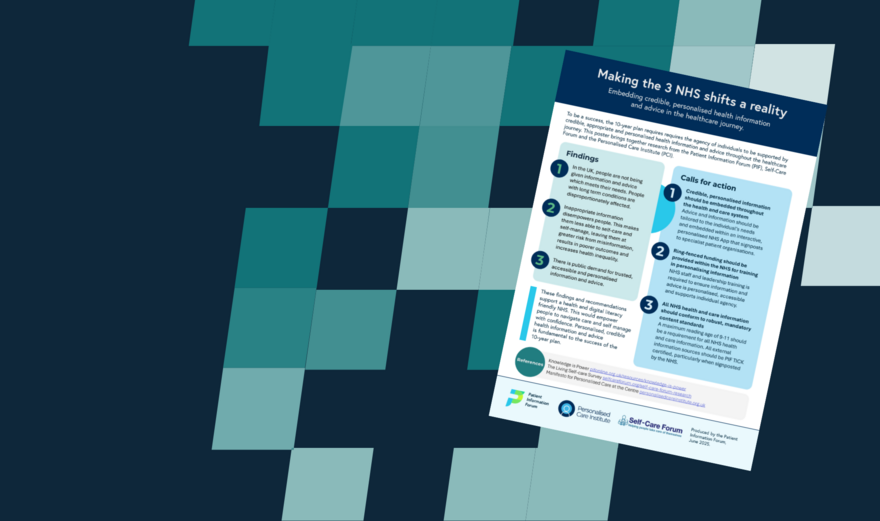
10-Year Plan risks failing without access to credible, personalised health information and advice
A joint statement published today (23 June) calls for credible, personalised health information and advice to be embedded throughout the healthcare journey. The statement brings together research by the Patient Information Forum (PIF), Self-Care Forum and the Personalised Care Institute (PCI). Key themes which run through all three pieces of research include:
- In the UK, people are not being given information and advice which meets their needs. People with long term conditions are disproportionately affected.
- Inappropriate information disempowers people. This makes them less able to self-care and self-manage, leaving them at greater risk from misinformation, results in poorer outcomes and increases health inequality.
- There is public demand for trusted, accessible and personalised information and advice.
Sue Farrington, PIF Chair, said: “The 10-year plan sets out three shifts – to communities, towards prevention and towards greater use of technology. All require the agency of individuals and communities to be supported by credible, appropriate and personalised health information and advice throughout the healthcare journey. Without this, the crucial personal behaviour change required will not occur.”
Calls to action
The statement includes three calls to action:
- Credible, personalised information should be embedded throughout the health and care system. Advice and information should be tailored to the individual’s needs and embedded within an interactive, personalised NHS App that signposts to specialist patient organisations.
- Ring-fenced funding should be provided within the NHS for training in personalising of information. NHS staff and leadership training is required to ensure information and advice is personalised, accessible and supports individual agency.
- All NHS health and care information should conform to robust, mandatory content standards. A maximum reading age of 9-11 should be a requirement for all NHS health and care information. All external information sources should be PIF TICK certified, particularly when signposted by the NHS.
Dr Peter Smith OBE, President, The Self-Care Forum, said: “Our research demonstrates that people understand and practice self-care and want greater control over their health, but struggle to find the good quality, trustworthy information and professional support to achieve it.”
Andy Riley, Head of the PCI, said: “Embedding personalised care into daily practice is not easy, especially at-scale, but if the 10 Year Plan is going to succeed then the NHS workforce must be trained to empower people to have greater choice and control over their health. Unfortunately our research shows that it isn't happening right now, but, if we can embed personalised care across the NHS, we'll reduce service pressures and improve patient outcomes and experiences.”
